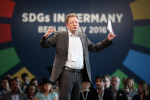A conference on 'Jump-starting the SDGs in Germany: Natural Resources and Sustainable Consumption and Production' addressed the challenges and opportunities of implementing the Sustainable Development Goals (SDGs) in Germany and worldwide.
It focused on natural resources and sustainable consumption and production (SCP) patterns, taking into consideration Germany's role as a major consumer of natural resources in a globalized world.
Participants also focused on the potential role of partnerships in supporting effective implementation of the SDGs.
 5 May 2016: A conference on ‘Jump-starting the SDGs in Germany: Natural Resources and Sustainable Consumption and Production’ addressed the challenges and opportunities of implementing the Sustainable Development Goals (SDGs) in Germany and worldwide. It focused on natural resources and sustainable consumption and production (SCP) patterns, taking into consideration Germany’s role as a major consumer of natural resources in a globalized world. Participants also focused on the potential role of partnerships in supporting effective implementation of the SDGs.
5 May 2016: A conference on ‘Jump-starting the SDGs in Germany: Natural Resources and Sustainable Consumption and Production’ addressed the challenges and opportunities of implementing the Sustainable Development Goals (SDGs) in Germany and worldwide. It focused on natural resources and sustainable consumption and production (SCP) patterns, taking into consideration Germany’s role as a major consumer of natural resources in a globalized world. Participants also focused on the potential role of partnerships in supporting effective implementation of the SDGs.
The event convened from 2-4 May 2016, at Andel’s Hotel, in Berlin, Germany. Over 330 representatives of government, science, civil society and business participated.
Conference Chair Alexander Müller, German Council for Sustainable Development (RNE) and The Economics of Ecosystems and Biodiversity (TEEB) for Agriculture and Food, said that while national models to SDG implementation may differ, they all must be participatory. Müller underscored the “triple challenge” in Germany to: change domestically; respond to the impact of its attitudes and actions on other countries, for example through patterns of production and consumption; and participate in multilateral processes. He also called for establishing and reviving partnerships for implementation.
In a keynote address, Christian Schmidt, Federal Minister of Food and Agriculture, Germany, highlighted that war and conflict lead to destruction of agricultural production and rural livelihoods, while increased food prices and insecure food supplies increase the risk of conflict. He also: drew attention to inappropriate production in water-scarce areas, such as dairy production; stressed the need for society to invest in biomass and other renewable energy sources to decarbonize; and said prices in developed countries need to reflect the costs of sustainability practices, which will require awareness-raising for social acceptance. Schmidt also highlighted Germany’s national sustainability strategy and his Ministry’s programme on promoting sustainable consumption, and called for working across ministries, not in silos, and discussed multi-stakeholder initiatives to promote the use of sustainably-produced certified agricultural commodities, including palm oil and cocoa, improving livelihoods and sustainability outcomes throughout the production chain.
Maja Fjaestad, State Secretary to the Swedish Minister for Strategic Development and Nordic Cooperation, noted Sweden’s commitment to becoming the first “fossil fuel-free welfare state.” Harald Braun, Permanent Representative of Germany to the UN, stressed his government’s commitment to taking early action on implementation of the 2030 Agenda for Sustainable Development, including by presenting a voluntary national review at the 2016 session of the High-level Political Forum on sustainable development (HLPF). Swiss Ambassador Michael Gerber said 82% of Switzerland’s water consumption is attributable to the import of water-intensive products. He said his country’s model of direct democracy supports exchange with non-state actors, and called for enhanced collaboration with the private sector.
Klaus Töpfer, Institute for Advanced Sustainability Studies (IASS), called for “first-mover” initiatives of developed countries to use technologies and approaches that can be replicated in all countries at different scales. He advocated for shifting the focus from “costs” and “sacrifice” for sustainable development towards the concept of investment for future benefits. Töpfer also suggested asking countries to submit “intended nationally-determined strategies (INDS)” for SDG implementation to the HLPF.
On the final day, Müller reviewed the Chair’s conclusions from the three-day conference, including:
- Governments should “act now” to capitalize on the momentum created by the adoption of the SDGs and the Paris Agreement on climate change, and initiate national follow-up action to be presented at the HLPF in July 2016. While these global agreements fundamentally challenge current development pathways, they also offer opportunities; however these opportunities can only be realized if the SDGs are influencing key development drivers, such as trade policies, investments and the financial architecture.
- Implementation of the SDGs should create opportunities for participation and a more “level playing field.” Partnerships should be drawn upon to make processes more inclusive.
- First-mover countries should lead by example, and have a special responsibility in setting good precedents and practices for implementation.
- Implementation of the SDGs should be seen as a global learning process.
- Germany’s implementation of the SDGs will be guided by a revised National Sustainability Strategy, which will need to address three dimensions of implementation: in Germany, by Germany and with Germany.
The meeting was organized by the German Federal Ministry of Food and Agriculture (BMEL) and IASS, and co-hosts the Stockholm Environment Institute (SEI), the Institute for Sustainable Development and International Relations (IDDRI), Germanwatch, the World Centre for Sustainable Development (RIO+ Centre), Sustainable Development Solutions Network (SDSN) Germany, Fachagentur Nachwachsende Rohstoffe (FNR) and International Institute for Sustainable Development (IISD). [IISD RS Meeting Coverage] [IASS Conference Website]